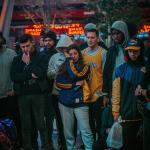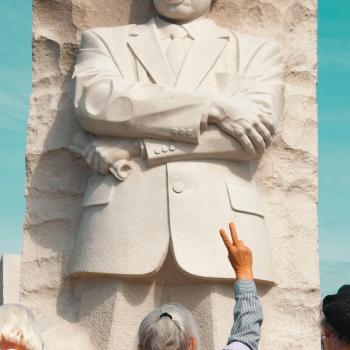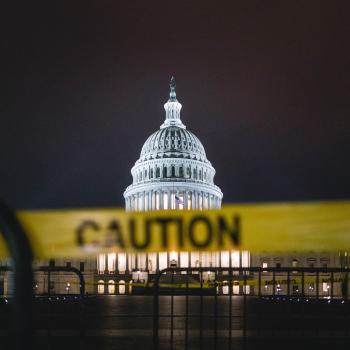I’m launching this blog at Patheos at the tail end of summer of 2020, which is quickly becoming one of the most distracting times of our lives. Every day brings strange, almost surreal news items. Just the other day, our president advised citizens to vote twice this fall—and more generally, he continued insinuating that the election process is fatally flawed and “rigged.” Besides the presidential election heating up, and the rising racial tensions, the whole country is stressed out over the coronavirus pandemic.
At the moment, and amid all these other disasters, the economic crash means millions of families will be missing rent and mortgage payments, going forward. Meanwhile my campus began face to face classes this past month, and already one of my colleagues reported that two of his students tested positive for the virus right after they met. Notre Dame and the University of North Carolina earlier announced they are going fully online, after attempting a return to campus. A couple weeks ago, the Gulf Coast got hammered by a Category 4 hurricane named Laura. Meanwhile, most of the west coast seems to be on fire, and another hurricanes is inching up toward the Gulf Coast. Nobody knows (in mid September of 2020) how bad any of this might become.
Yes: Anxiety is thick in the air.
So why start yet another blog? It must take some nerve to attempt that under present circumstances, said a friend of mine. But at least our major cities aren’t being attacked by bombers in the night skies (not yet, anyway).
As the United Kingdom was on the verge of entering fully into World War II, C. S. Lewis was asked to give a sermon. He delivered it in the autumn of 1939 in the church of St. Mary the Virgin in Oxford. His sermon has come down to us with the title, “Learning in War-Time,” and the main topic of his discourse had to do with education and learning, since he was of course at that time a college professor of English literature-like me, in fact.
Lewis wondered about the value of education and learning in times of national crisis: “What is the use of beginning a task which we have so little chance of finishing? Or, even if we ourselves should happen not to be interrupted by death or military service, why should we — indeed how can we — continue to take an interest in these placid occupations when the lives of our friends and the liberties of Europe are in the balance? Is it not like fiddling while Rome burns?”
Lewis went on to list three main enemies for the pursuit of learning in the midst of chaos and crisis. The first enemy is excitement — the tendency to think and feel about the war, when we had intended to think about our work. Today we might use a term like distraction, or emotional edginess, to describe all the ways the media “excite” our emotions and distract us from focusing on our duties.
The second enemy is frustration — the feeling that we shall not have time to finish. What’s the use of reading one more book, writing one more review, or starting yet another blog? Who cares, anyway—when the world is disintegrating before our eyes?
The third enemy is fear. War threatens us with death and pain, said Lewis. Such things are mysteries, as Alan Jacobs recently mentioned in his review of the film A Hidden Life:
“In the New Testament the word “mystery” refers to an event, or a reality, of overwhelming significance, but a significance that is either unstatable in words or altogether unknown. Thus St. Paul speaks of “the mystery of iniquity”—what in our more prosaic and insensible times we tend to call “the problem of evil.” In Paul’s view, to call iniquity a “problem” is to trivialize it beyond recognition. For one who believes not only in God but in the goodness and graciousness of God, iniquity is the profoundest of mysteries. One scarcely dares to speak of it at all, and nothing is more desperately to be avoided, on this subject, than glibness.”
Coronatime 2020 is much more than a mere “problem.” It’s a reveling moment of cataclysmic unveiling: showing each of us the things we truly value on Earth. Thus is it an event of “overwhelming significance,” even if we are speechless to define that significance.
How familiar are we all with those three enemies right now, in the midst of our own Corona-time crisis? Personally, I’ve never been an anxious person; in the course of my life, I’ve more often been described by my students as “chill,” and rarely feel stressed out. But I’m feeling it now, and my wife agrees: she’s never seen me so anxious about—whatever? All this makes me wonder how it must be feeling to someone my more anxiety-ridden friends, coworkers, and students.
I’m also quite aware of missing out on what I would consider some of the best “distractions” of my life. I miss those; such things as March Madness, The Masters golf tournament, and the opening days of Major League Baseball. All gone, wiped away, in the twinkling of an eye.
Or postponed—the way so many things feel these days. Travel to California? Postponed. Summer concerts like the 50 year anniversary of the Doobie Brothers? Postponed. Weddings, graduations, even funerals? Postponed. People talk about “cancel culture,” but what about “postpone culture”? And will we ever get those things back?
The good news is, all of these enemies have been defeated. Fear not, says the Lord, over and over. “God is our refuge, and God is our strength, an ever-present help in trouble” (Psalm 46:1). And so our missions in life, centered on truth, beauty, justice, or whatever, march on, too. The work of bloggers continues, as does my teaching at Saint Louis University, and your own vocation: online, or half-remotely, or even in person. But Lewis reminds us: we all must find a way to keep on keepin’ on.
If we do feel frustrated at times, that’s okay. Because we’re also able to see with amazement the resiliency and the resourcefulness of people all around us. The title above says “The Courage to Blog in Corona-Time,” riffing on Lewis. Maybe in these strange days, some of us are wondering what all the hard work and struggle has been for. Have our best efforts meant something? Does your own life and vocation mean anything, when the pandemic is hitting its stride? Why polish brass on a sinking ship?
We can take comfort and strength from the final words from Lewis’s sermon, on the brink of what would become known as “Total War”: the regular military bombing of civilian populations, as in the Battle of Britain in 1940. Talk about fear and trembling. In the midst of all that horror, Lewis wondered the same things, about the study of literature and the life of learning. Here is Lewis’ conclusion:
“If we thought we were building up a heaven on earth, if we looked for something that would turn the present world from a place of pilgrimage into a permanent city satisfying the soul of man, we are disillusioned, and not a moment too soon. But if we thought that for some souls, and at some times, the life of learning, humbly offered to God, was, in its own small way, one of the appointed approaches to the Divine reality and the Divine beauty which we hope to enjoy hereafter, we can think so still.”
The same is true for a life in search of justice. It is nothing less than an “appointed approach” to the Divine. So yes: we keep on keepin’ on—even in light of the mystery of iniquity. Be courageous, and keep doing what you value. As Wendell Berry once wrote: we “practice resurrection.” Yes: even in Corona-time, 2020.
featured image: Claudia Wolff, Unsplash












